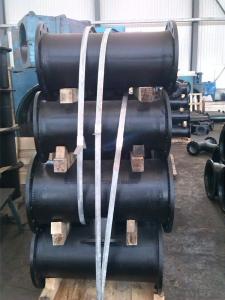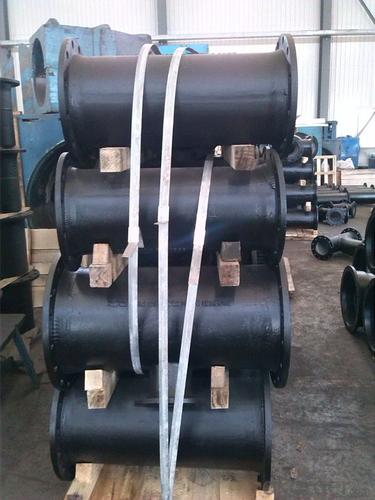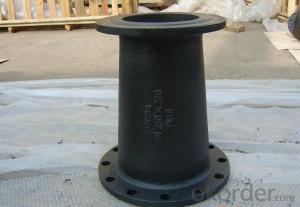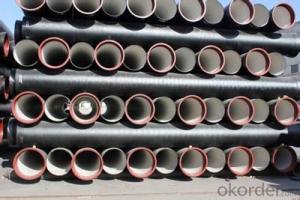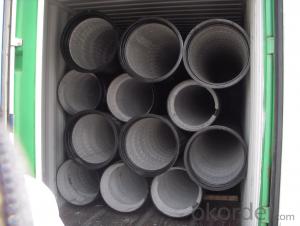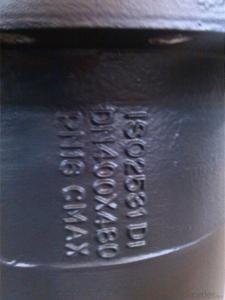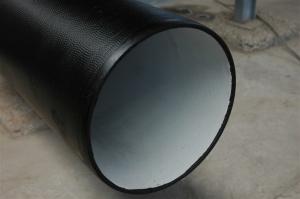DUCTILE IRON PIPE C DN 80
- Loading Port:
- Tianjin
- Payment Terms:
- TT OR LC
- Min Order Qty:
- -
- Supply Capability:
- 30000Tons m/month
OKorder Service Pledge
OKorder Financial Service
You Might Also Like
CNBM ductile iron pipe ranges from DN80-DN1600mm (T-Type, Class K9), effective length 6m, comply with ISO2531 Standard
Company Profile
CNBM International Corporation is the leading production base and renowned supplier of Ductile Iron Water Pipe systems of both potable and waste water in China. We are constantly looking to develop high quality products to ensure the longest service life and wonderful performance.
CNBM Pipelines regard quality as the essential factor leading to successful business. Every pipe is tested in accordance with BS EN545 (water application) or BS EN598 (sewer application). CNBM Pipelines products comply with and are tested according to the relevant European and International Standards. Our pipes are manufactured under the quality management system BS EN ISO 9001. After years of efforts, CNBM Pipelines has built up great reputation in terms of quality and service among customers worldwide
Product Introduction
CNBM ductile iron pipe ranges from DN80-DN1600mm (Tyton, T-Type, Class K7/K8/K9), effective length: 6m, complying with BS EN545/EN598/ISO2531/BS4772.
Specification& Payment terms
Internal lining: Pipes shall have an internal cement mortar lining in acc with ISO4179.
External coating: Pipes shall be externally coated with metallic zinc spray plus a further layer of resin painting to ISO8179.
Gasket: 100% SBR/NBR/EPDM gasket in accordance with ISO4633.
Packing: Pipes from DN100 to DN300 be bundled with steel belts, the others are in bulk.
Payment term: By 30% T/T advance payment + 70% Irrevocable L/C at sight.
Packing: In bulk vessel or in container.
- Q: The difference between ductile iron pipe and UPVC drain pipe
- Centrifugal ductile iron pipe is ideal for urban water supply, gas pipelines, sets of high strength, good ductility and corrosion resistance advantages, performance with nature, iron and steel, is the replacement of the traditional cast iron pipe and common steel pipe renewal;
- Q: Can ductile iron pipes be used for underground steam distribution systems?
- Ductile iron pipes are well-suited for underground steam distribution systems. They belong to the cast iron family, but have been treated with magnesium to enhance their flexibility and resistance to cracking. Consequently, they can endure high pressure and temperature conditions, making them ideal for underground applications like steam distribution systems. The strength and durability of ductile iron pipes are remarkable, allowing them to withstand the extreme conditions associated with steam distribution. Moreover, their corrosion resistance properties make them a dependable choice for long-term use in underground environments. Nevertheless, it is essential to apply proper insulation to prevent heat loss and ensure the efficiency of the steam distribution system.
- Q: How are ductile iron pipes installed?
- Typically, the installation of ductile iron pipes follows a specific process. Firstly, the required depth and width of the trench are excavated. Careful leveling and compaction of the trench's bottom then establish a stable foundation. Next, a bedding material, usually a mixture of sand and gravel, is placed at the trench's bottom. This material supports the pipe and distributes the load evenly, while also safeguarding it from any sharp objects in the soil. Once the bedding is prepared, the ductile iron pipes are gently lowered into the trench and aligned as desired. Proper alignment and the correct slope are essential for efficient water flow. Subsequently, the pipes are joined together using either a mechanical joint or a push-on joint system. These joints are designed to create a secure, leak-free connection between the pipes. Rubber gaskets are typically used to seal the joints and establish a watertight seal. After joining the pipes, the trench is backfilled with the excavated soil. Care is taken to compact the soil in layers to prevent settlement. The backfilling process is typically carried out in stages to ensure proper compaction. Lastly, the installation is completed by connecting the ductile iron pipes to the existing water supply system or other pipes using appropriate fittings and valves. Pressure testing may also be conducted to verify the installation's integrity. In conclusion, the installation of ductile iron pipes necessitates meticulous planning, precise alignment, and secure jointing to establish a durable and dependable water supply system.
- Q: Can ductile iron pipes be used for underground oil and gas pipelines?
- Underground oil and gas pipelines can utilize ductile iron pipes, which offer a robust and enduring material capable of withstanding the demanding characteristics of oil and gas transportation. With its exceptional tensile strength and impact resistance, ductile iron brings a high level of suitability for subterranean applications. Additionally, these pipes exhibit resistance against external loads, a crucial attribute for underground pipelines that might experience soil movements or heavy traffic. Moreover, the easy assembly of ductile iron pipes facilitates efficient installation and maintenance procedures. Nevertheless, it is crucial to carefully consider a range of factors, including soil conditions, environmental elements, and specific project prerequisites, prior to selecting ductile iron pipes for underground oil and gas pipelines.
- Q: Are ductile iron pipes resistant to root intrusion?
- Yes, ductile iron pipes are generally resistant to root intrusion due to their strong and durable composition.
- Q: What effect does magnesium play in nodular cast iron?
- The role of magnesium as spheroidizing agent used in iron spheroidizing treatment, promote water ink is made of iron, carbon in liquid iron spherical graphite precipitation.
- Q: Why does the construction wastewater system use ductile iron pipes instead of galvanized steel tubes?
- The sewerage system uses ductile iron pipes. The premise should be pressure pipe drainage. It must be a special occasion, otherwise the cost will be high. In general, precast concrete pipes are recommended.
- Q: How can the cast iron pipe be connected?
- Drain pipe or water supply pipe?. The drainage tube as stated on the first floor, water supply pipe of T type and K type and S type, currently dominated by T, a lot of Xinxing Pipes as well, when connecting with T type rubber ring socket socket into the brand, after inserted with oil. The installation team is generally safe.
- Q: What is the expected maintenance for ductile iron pipes?
- The expected maintenance for ductile iron pipes typically includes regular inspections for signs of corrosion or damage, cleaning to remove any sediment or debris buildup, and occasional repair or replacement of sections that are worn or compromised.
- Q: Are ductile iron pipes suitable for use in wastewater treatment plants?
- Ductile iron pipes are indeed a suitable option for utilization in wastewater treatment plants. This is due to the fact that ductile iron possesses immense strength and durability, enabling it to endure the harsh and corrosive environment commonly found in such facilities. Furthermore, it boasts exceptional resistance against abrasion, corrosion, and chemical assaults, rendering it a dependable choice for the conveyance of wastewater and the handling of diverse chemicals and substances encountered in the treatment process. Another advantage of ductile iron pipes lies in their high tensile strength, allowing them to withstand both high-pressure conditions and the weight of the surrounding soil. Moreover, these pipes are renowned for their flexibility, affording them protection against ground movement and settlement, thus ensuring long-lasting performance and dependability within wastewater treatment plants.
Send your message to us
DUCTILE IRON PIPE C DN 80
- Loading Port:
- Tianjin
- Payment Terms:
- TT OR LC
- Min Order Qty:
- -
- Supply Capability:
- 30000Tons m/month
OKorder Service Pledge
OKorder Financial Service
Similar products
Hot products
Hot Searches
Related keywords
